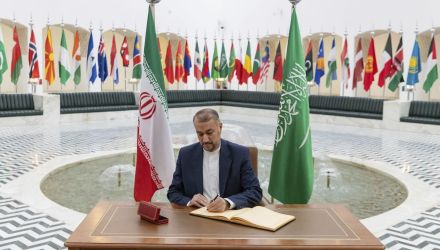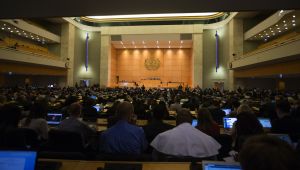Brenda Shaffer wants to shatter our stereotypes about Muslim societies. "OK, here's a quiz," she says. "Which of these four countries was the first to institute women's suffrage - Britain, France, the United States, or Azerbaijan?"
The answer is Azerbaijan, which, under the secularist Musavat (Equality) Party, gave women the vote in 1918, beating the United States by two years, Britain by 10, and France by 27. The country, while 90 percent Shiite Muslim, remains largely secular and maintains good relations with the United States and Israel and poor relations with its theocratic neighbor Iran.
Shaffer follows this startling fact with a story emphasizing a similar point. She was in Washington recently with a former vice minister of energy from Kazakhstan. A State Department official took the opportunity to question the man:
"If the U.S. goes to war with Iraq, what will your people's reaction be?"
Shaffer says, "The State Department official assumed that because most of the population in Kazakhstan is Muslim, there would be a major response, but I could see from the puzzled expression on the man's face that the idea that religion would enter into this issue hadn't occurred to him."
Shaffer is research director of the Kennedy School's Caspian Studies Program. Its chairman is Graham Allison, the Douglas Dillon Professor of Government. Founded in 1999, the Caspian Studies Program focuses on those countries that surround the Caspian Sea, the huge saltwater lake known for its oil deposits and its caviar.
Even the program's title represents something of a paradigm shift. Under a more traditional scheme, Iran, which borders the Caspian on the South, would be considered part of the Middle East. Kazakhstan, Uzbekistan, and Turkmenistan on the East would be seen as part of Central Asia, while on the West, Azerbaijan, Armenia, and Georgia would be part of the Caucasus. Russia, which borders the Caspian to the West and North, has always been a geographic anomaly because it spans both Europe and Asia.
But the term "Caspian region" makes sense because the countries are all part of the Caspian basin, and Shaffer believes that defining regions in functional terms, based on how people live, whom they interact with, what their economic and security interests are, makes more sense than simply drawing an arbitrary line around a geographic area.
Part of what Shaffer hopes to do is get people, and especially U.S. policy-makers, to see the world in these functional terms rather than make assumptions on the basis of cultural, ethnic, or religious identity. As far as the Caspian region goes, she believes that shift is crucial.
"These are countries that can contribute to our energy security, to nuclear nonproliferation, to antiterrorism," she says, "and they were cooperating before 9/11!"
Kazakhstan, for example, signed the Non-Proliferation Treaty in 1993 and willingly gave up more than 1,400 nuclear warheads abandoned there after the breakup of the Soviet Union. In September 2002, Kazakhstan and Uzbekistan peacefully resolved a border dispute that could have erupted into war.
These accomplishments are significant for U.S. security. Kazakhstan has huge oil reserves that could make it one of the world's largest oil suppliers in the future. Uzbekistan is already an important staging area for military and humanitarian efforts in Afghanistan.
Funded by several multinational oil companies (which have a vested interest in maintaining stability in the region), the Caspian Studies Program brings midcareer professionals from the Caspian area to study at the Kennedy School for one year.
The program also publishes books and policy papers that discuss important issues having to do with the Caspian region. Finally, the program conducts an outreach effort to help policy-makers in the United States and other countries "make good decisions."
Shaffer has made important contributions to this effort. In October 2001, she briefed the U.S. House of Representatives International Relations Committee on the Caspian region. She has written op-ed pieces in The Wall Street Journal, the Christian Science Monitor, and other papers, and has published several books, including "Borders and Brethren: Iran and the Challenge of Azerbaijan Identity" (MIT Press, 2002), a study of how Azerbaijanis deal with cross-border issues.
More than twice as many Azeris (the dominant ethnic group of Azerbaijan) live in Iran than in their home country. Iran is currently half Persian, nearly a third Azeri, and about one-sixth Kurdish, Arab, and other ethnic groups - another indication, Shaffer points out, that the oft-invoked designation "Muslim state" may obscure the fact that countries are often fragmented along other identity lines. The book is based on Shaffer's Ph.D. dissertation in political science.
An American raised and educated in Israel, Shaffer says that her exposure to Israeli-Arab hostility might have made her a believer in the doctrine that certain cultures are inherently antagonistic to one another.
But what struck Shaffer about the Middle East conflict and about many others is that they are basically about land, water, and other resources. Ethnic hatreds, she believes, are inflamed by leaders who mobilize rhetoric to engage the emotions of potential constituents. It is only by pushing these emotional hot buttons that they are able to motivate the support they need to attain political ends.
"Culture comes into play once we begin to fight. We don't fight because we hate. We hate because we fight."
Shaffer thinks she may have been drawn to the Caspian region because most of its people are Muslim, but harbor no inherent antagonism to the West or to Israel.
In her forthcoming book, "The Limits of Culture: Islam, Foreign Policy and the Caspian," Shaffer challenges the view that culture is a leading factor in shaping a state's foreign policy and determining its allies.
"The foreign policies that emerged in the states of the Caspian region, especially the Muslim ones, do not support the culturalist explanation of foreign policy, rather just the opposite,"she says.
Shaffer's research shows that the Muslim states of the Caspian region - including the Islamic Republic of Iran - have rarely subordinated important material interests, such as security and regime preservation, to the pursuit of Islamic-based interests. Nor have the coalitions formed in the Caspian region been determined by shared cultural or religious affiliations.
"In fact, culture seems to give us little explanatory or predictive power in understanding the foreign policies of these states," she said.
So far, the Caspian region has not seen the kind of intense hatreds and escalating violence that have engulfed the Middle East. The notable exception is the conflict between Azerbaijan and Armenia over the Nagorno-Karabagh region. And yet, even here, hostilities have not risen to the level they have in the Arab-Israeli conflict.
Shaffer said that when she visited an Azerbaijani refugee camp recently, the people did not express hatred for their enemy, but simply requested help in education. She learned that there had not been one incident of terrorism, despite the fact that 800,000 Azerbaijani refugees emerged from the conflict and have been separated from their homes for 10 years.
"The difference is, they haven't been encouraged by their leaders to use terror," she said.
But she cautions that the continued friendship and cooperation of the region depends on how the United States treats these nations. So far, she says, American foreign policy in the region has been characterized by caution, tightfistedness, and the kind of uninformed assumptions typified by the State Department official's question quoted earlier. This must change if we are to retain the area's good will.
"I don't want to be sitting here 10 years from now saying, 'How did we lose the Caspian?'"
The full text of this publication is available via Harvard Gazette.


